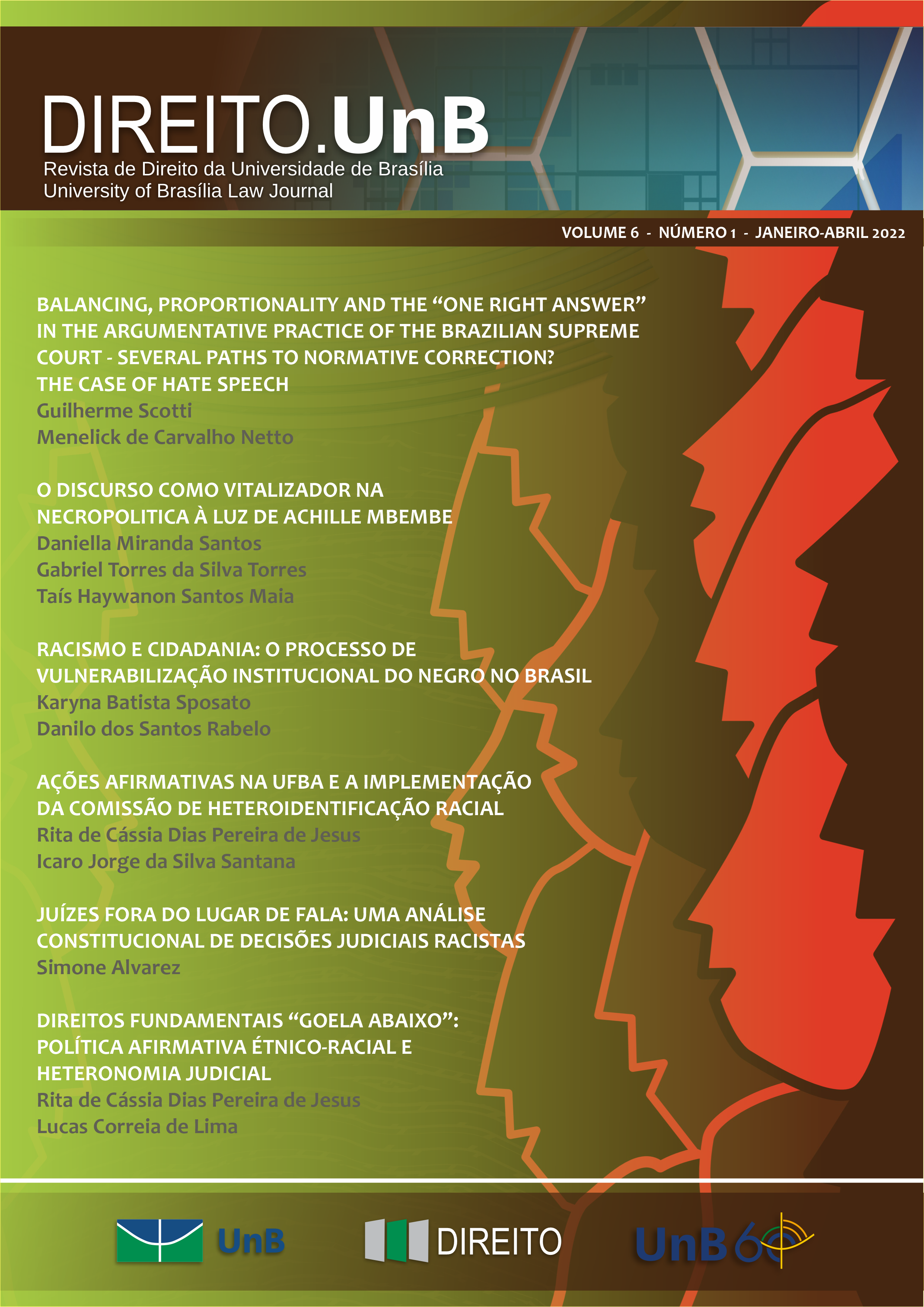BALANCING, PROPORTIONALITY AND THE “ONE RIGHT ANSWER” IN THE ARGUMENTATIVE PRACTICE OF THE BRAZILIAN SUPREME COURT - SEVERAL PATHS TO NORMATIVE CORRECTION? THE CASE OF HATE SPEECH
Palavras-chave:
Balancing, One-right-answer, Fundamental Rights, Constitutional InterpretationResumo
The axiological theory of fundamental rights reached in the last decades great academic and institutional repercussion in Latin America, including Brazil. It is commonly called a ‘post-positivist’ theory but, by rejecting Dworkin's thesis of ‘the one right answer’ it maintains elements that, as we argue, are typical of legal positivism. We herein discuss if, in light of a deontological theory of rights a correct decision would be possible, even if based on axiological terms of value-weighting. The rationale for a decision expressed in terms of conflicts of rights reduces the indispensability of fundamental rights. We argue, however, that this does not, of itself, prevent the decision taken from being correct. We use as an example the decision in which the Brazilian Supreme Court discussed whether the constitutional provision that no statute of limitations applies to the crime of racism could be extended to the publication of anti-Semitic hate speeches. Referring to the ideas of balancing and proportionality the court concluded that, under Brazilian law, anti-Semitic hate speech constitutes the crime of racism. We maintain that such a decision proves to be the only correct one under Brazilian Law in the deontological sense. Despite the argumentative damage brought to the internal debate of the courts on the role of fundamental rights, such decisions can nevertheless be able to discern, in the concrete cases, the legitimate from the abusive claims, so as to enable the Law to consistently confront the tendency to abusive and merely instrumental use of the Law itself.
Downloads
Referências
ALEXY, Robert. Sistema jurídico, principios jurídicos y razón práctica. Doxa, n. 5, 1988.
ALEXY, Robert. Teoria de los derechos fundamentales. Madrid: Centro de Estudios Constitucionales, 1993.
ALEXY, Robert. On the Structure of Legal Principles. Ratio Juris, v. 13, n. 3, p. 294-304, 2000.
BERLIN, Isaiah. Liberty: Incorporating four Essays on Liberty. Oxford: Oxford University Press, 2002.
BRASIL. HC 82424/RS. Habeas Corpus. Publicação de livros: anti-semitismo. Crime imprescritível. Conceituação. Abrangência constitucional. Limites. Ordem denegada. Relator orig.: Min. Moreira Alves. Relator para o acórdão: Min. Maurício Corrêa. , Supremo Tribunal Federal, 2003.
CATTONI, Marcelo. Direito, política e filosofia: contribuições para uma teoria discursiva da constituição democrática no marco do patriotismo constitucional. Rio de Janeiro, 2007.
CHUEIRI, Vera K. Before the law: Philosophy and Literature (the Experience of that Which one cannot Experience). Graduate Faculty of Political and Social Science, New York, New School University, Ph.D.: f. 216, 2004.
DWORKIN, Ronald. Taking Rights Seriously. Cambridge, Mass.: Harvard University Press, 1977.
DWORKIN, Ronald. Is Democracy Possible Here?: Principles for a New Political Debate. Princeton, N.J.: Princeton University Press, 2006.
DWORKIN, Ronald. Justice in Robes. Cambridge, Mass.: Belknap Press, 2006.
DWORKIN, Ronald. Justice for Hedgehogs. Cambridge, Mass.: The Belknap Press of Harvard University Press, 2011.
FERRARA, Francesco. Interpretação e aplicação das leis. Coimbra: Arménio Amado, 1963.
GREENE, Jamal. Foreword: Rights as trumps? Harvard Law Review, v. 132, n. 1, pp. 28-132, 2018.
GÜNTHER, Klaus. The sense of Appropriateness: Application Discourses in Morality and Law. Albany: State University of New York Press, 1993.
HABERMAS, Jürgen. Between Facts and Norms: Contributions to a Discourse Theory of Law and Democracy. Translated by William Rehg. MIT Press, 1996.
HABERMAS, Jürgen. Consciência moral e agir comunicativo, Trad. Guido A. de Almeida. Rio de Janeiro: Tempo Brasileiro, 2003.
HESSE, Konrad. Die normative Kraft der Verfassung: Freiburger Antrittsvorlesung. Mohr, 1959.
KRIELE, Martin. Introducción a la teoría del Estado. Buenos Aires: De Palma, 1980.
MENDES, Gilmar. F. Direitos fundamentais e controle de constitucionalidade: estudos de direito constitucional. São Paulo: Saraiva, 2004.
MOUFFE, Chantal. Deliberative Democracy or Agonistic Pluralism?. Social Research, v. 66, n. 3, p. 745-758, 1999.
ROSENFELD, Michel. The Identity of The constitutional Subject: Selfhood, Citizenship, Culture and Community. Routledge, NY, 2010.

Downloads
Publicado
Como Citar
Edição
Seção
Licença
Copyright (c) 2022 Direito.UnB - Revista de Direito da Universidade de Brasília

Este trabalho está licenciado sob uma licença Creative Commons Attribution-NonCommercial-NoDerivatives 4.0 International License.
Autores que publicam na Revista Direito.UnB concordam com os seguintes termos:
- Autores mantêm os direitos autorais e concedem à revista o direito de primeira publicação, com o trabalho simultaneamente licenciado sob a Licença Creative Commons - Atribuição-NãoComercial-SemDerivações 4.0 Internacional que permite o compartilhamento do trabalho com reconhecimento da autoria e publicação inicial nesta revista.
- Autores têm autorização para assumir contratos adicionais separadamente, para distribuição não-exclusiva da versão do trabalho publicada na Revista Direito.UnB (ex.: publicar em repositório institucional ou como capítulo de livro), com reconhecimento de autoria e publicação inicial nesta revista.
- Autores têm permissão e são incentivados a publicar e distribuir seu trabalho online (ex.: em repositórios institucionais ou em suas páginas pessoais) a qualquer momento após à definição do processo editorial.
- Autores concordam que, eventualmente, seus trabalhos poderão ser agregados pela Revista Direito.UnB às bases e sistemas de informação científica existentes (indexadores e bancos de dados atuais) ou que existam no futuro (indexadores e bancos de dados futuros). Os detentores dessas bases de dados terão a possibilidade de realizar as seguintes ações sobre o artigo:
- Reproduzir, transmitir e distribuir o artigo, no todo ou em parte sob qualquer forma ou meio de transmissão eletrônica existente ou desenvolvida no futuro, incluindo a transmissão eletrônica para fins de pesquisa, visualização e impressão;
- Reproduzir e distribuir, no todo ou em parte, o artigo na impressão;
- Capacidade de traduzir certas partes do artigo;
- Extrair figuras, tabelas, ilustrações e outros objetos gráficos e capturar metadados, legendas e artigo relacionado para fins de pesquisa, visualização e impressão;
- Transmissão, distribuição e reprodução por agentes ou autorizada pelos proprietários de distribuidoras de bases de dados;
- A preparação de citações bibliográficas, sumários e índices e referências de captura relacionados de partes selecionadas do artigo;
- Digitalizar e/ou armazenar imagens e texto de artigo eletrônico.





